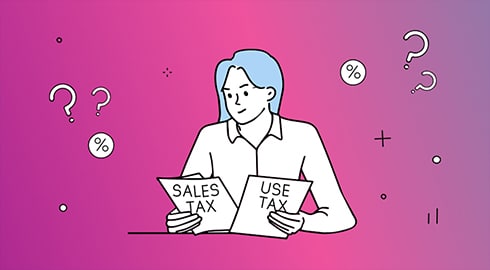You raise your glass of champagne to your team and thank them for being on this journey with you. Finally, your SaaS “startup” is gaining traction. US-based subscribers are signing up from all 50 states. We don’t want to throw cold water over your big day, but did you know you’re triggering nexus? Thanks to your amazing growth, many states now hold you liable to collect and remit sales tax and if you haven’t already applied for the relevant sales tax permits, your company could land in hot water. Why is this so? Due to the lack of standardization of US sales tax, many US-based businesses never know for certain whether they’re are liable to pay taxes in particular states without hiring a hotshot accounting firm. But throwing money at the problem isn’t the only way to stay compliant.
In this article we’ll be exploring the first thing that absolutely, positively must be on your to-do list if you’re selling online in the United States: Applying for a sales tax permit.
What are sales tax permits?
You’ve probably heard the words “sales tax permit,” “seller’s permit,” and “sales tax license” being thrown around. They’re the same – a document granting you legal authorization to collect sales tax from customers and remit it to the appropriate tax authorities. Understanding what they are is critical, because US businesses selling taxable goods or services without a sales tax permit risk committing a misdemeanor violation of the Sales and Use Tax Law. Read on to see how to avoid pauing unnecessary interest charges and penalties for not having one.
Why sales tax permits matter
Let’s quickly cover the basics first.
- Obtaining a sales tax permit is often a legal requirement for businesses that sell taxable goods or services
- A sales tax permit authorizes your business to collect sales tax from customers and remit it to the appropriate tax authorities
- Operating without a required sales tax permit can lead to penalties, fines, or legal actions by tax agencies
But sales tax permits are also important when business is booming
For businesses expanding their reach beyond state borders, sales tax permits are the first step towards compliance, allowing you to collect and remit sales tax in different states legally.
Scalability
Sales tax laws vary from state to state, so companies need to understand the sales tax laws in the states where they want to expand. A sales tax permit is step one on this journey.
Credibility
Customers are more likely to trust businesses that are legitimate and compliant with the law, especially with customers in new states. A sales tax permit is foundational to building credibility in new markets.
Transparency
When online customers are aware that a business is collecting sales tax and remitting it to the appropriate authorities, they are more likely to subscribe, buy, engage with and trust the company.
Do I need a sales tax permit for online stores?
Most enterprises need a sales tax permit to sell online. But it’s by no means a golden rule, as several factors come into play.
Physical and economic nexus
Penalties and fines, interest charges, audits and investigations, legal issues, and reputation damage are the can of worms growing companies can inadvertently open by triggering nexus. Physical nexus is established when a business has a store, office, or warehouse in a state. Economic nexus is based on sales revenue, or the number of transactions in a particular state, even without a physical presence. Registering for a sales tax permit in each state where you have nexus and collect and remit sales tax accordingly is a must-do.
Marketplace facilitator laws
Due to this law, many states require online marketplaces, such as Amazon or Shopify, to collect and remit sales tax on behalf of their sellers. You don’t need a sales tax permit if you’re selling on Amazon, as they file a return for the state each month, relieving you of the duty to collect and remit your taxes. Shopify isn’t simple, but it’s advisable to consult with your state’s Department of Revenue or seek professional advice to avoid consequences.
Remote sales
For companies that sell into a state without a physical presence, needing a sales tax permit depends on each state’s specific laws, whether the marketplace collects sales tax on sellers’ behalf and any local government requirements. When in doubt, apply the golden rule of consulting with your state’s revenue department or seek professional advice.
Taxable Products
Ensure your products are taxable. Some products or services may be exempt from sales tax in certain states, so it’s essential to research the taxability of your products or services in each state where you have nexus.
How to get a retail sales tax permit (the DIY route)
While the specific process can vary from state to state, here is a general overview of how to get a sales tax permit.
1. Determine Your Nexus
Before applying for a sales tax permit, determine whether you have a sales tax nexus in a particular state. In that state, this can be a physical presence (like a store or warehouse) or an economic presence (meeting sales thresholds).
2. Apply for the permit
Most states offer an online portal for sales tax permit applications. Create an account, complete the application, and provide the required information. Some states require you to visit a local tax agency office to apply in person.
3. Register with the State Tax Authority
Once you’ve identified the states where you have a nexus, visit the state’s tax authority website. They often have a dedicated section for sales tax registration. You should create an account or log in if you already have one.
4. Complete the Application
Fill out the sales tax permit application. You’ll need to provide information about your business, including its legal structure, physical address, and federal employer identification number (EIN).
5. Submit Required Documents
Depending on the state, you may be required to submit additional documents, such as your Articles of Incorporation or a copy of your EIN. Make sure you have these documents ready to upload or mail in.
6. Provide Nexus Information
You’ll likely need to provide information about your nexus in the state, whether it’s a physical or economic presence. This could involve details about your physical locations or your sales volume in the state.
7. Specify Products or Services
Some states may require you to specify the types of products or services you’ll be selling. This helps them determine the appropriate sales tax rates for your business.
8. Wait for Approval
After submitting your application, you must wait for the state to process it. This may take a few weeks. Some states require you to pay a fee when applying.
Receive Your Permit
Once your application is approved, you’ll receive your sales tax permit. This might be a physical permit you display at your business location or an electronic one you can access online.
Reasons not to get a DIY sales tax permit
The pain of DIY sales tax permits (come after).
1. Lack of expertise
DIY applications require a deep understanding of complex tax laws and regulations, including determining if your business has nexus. Nexus complexity is multiplied by 50 since each state has its own set of regulations.
2. Incomplete or incorrect information
Filling out the application incorrectly or providing incomplete information can result in delays or rejections. Ensuring accuracy and completeness is difficult when sales tax isn’t your lane.
3. Compliance challenges
Getting your sales tax permit is the “easy” part. But now, you’ll be responsible for collecting and remitting your sales tax relevant to each state. Keeping track of sales, calculating tax amounts, and submitting timely payments. Failing to comply with any of these obligations will cost you.
4. Changing regulations
Sales tax laws and rules can vary across jurisdictions and change frequently. Staying up-to-date with these changes can be challenging, especially if you need to become more familiar with the intricacies of tax compliance.
5. Time-consuming process
Research. Paperwork. Potentially dealing with government agencies, meaning more even admin. Where do you find the time when you’re running your business?
As sales tax rules and rates vary from state to state, companies must be constantly updated on the current legislation and how they classify their specific product/service (as this will also impact the rate). Manually calculating this almost always results in errors. Even companies with sales tax solutions often complain that the rates aren’t accurate for their specific industry.
The down low
With sales tax, even a tiny mistake can lead to hot water penalties and legal costs that far outweigh the cost of using a SaaS solution like Complyt. This fully integrated US sales tax solution enables companies to meet all their US sales tax obligations. From highlighting exposure, calculating applicable tax rates, and determining tax exemption, chat to us about how Complyt lets your business scale with excitement rather than the fear of conquering new states and markets .









